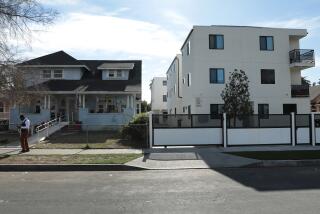How crowded is too crowded?
No one wants to live near a noisy, crowded boarding house whose residents are, at the least, an annoyance and, at the worst, a threat to public health and safety. City nuisance laws and zoning codes are supposed to minimize such problems, but they’re not enforced consistently or effectively against bad operators.
So L.A. City Councilman Mitchell Englander has been trying to craft an ordinance that would tighten laws on group homes and boarding houses. The L.A. Municipal Code currently defines a “family” as any group of people living in a residence and sharing access to common areas such as kitchens and bathrooms, a definition that offers advantages in a diverse city but makes it difficult to shut down a badly run boarding house.
Englander initially proposed a Community Care Facilities Ordinance that added restrictions on groups of people living together, the crucial one being a rule allowing only one lease per house in single-family and low-density neighborhoods. This would have made life hard for boarding houses, but it would also have jeopardized well-run group homes that serve veterans, the disabled and people recovering from substance abuse, among others. Some of those residents are receiving housing assistance that requires them to be on separate leases. Even seniors, college students or budget-conscious adults who band together in a house on multiple leases would have risked violating the law. As a result, the original ordinance was opposed by dozens of social service organizations, including the United Way.
Now Englander has retooled the measure, making several significant changes. One would allow three leases per group home rather than just one. The problem is that community advocates say even three would limit options for people in legitimate, responsible group residences. We agree.
Another change is more promising. It would allow unlicensed group homes that serve a societal need to apply, for free, for “reasonable accommodation” status, permitting them to house as many as two people per bedroom on several leases if the operators met various conditions, including providing sufficient parking and agreeing not to light the premises too brightly.
Englander is putting the new version of his ordinance before a meeting Monday of the City Council’s Public Safety Committee at which the public can weigh in. That’s a smart move. The councilman and the critics of his ordinance should see if there is a solution they can all live with before the full council votes on it next month.
More to Read
A cure for the common opinion
Get thought-provoking perspectives with our weekly newsletter.
You may occasionally receive promotional content from the Los Angeles Times.






